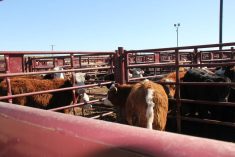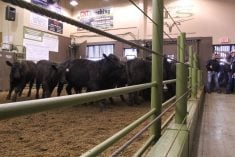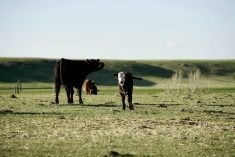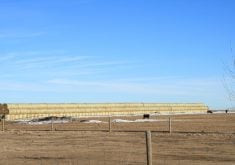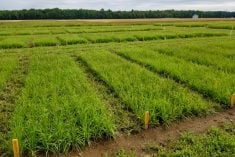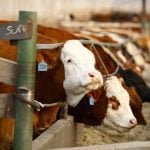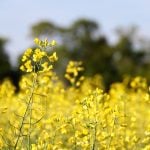Reg Schellenberg knows what it’s like to be a young rancher, just starting out with the odds stacked against his family.
In the early 1980s, Schellenberg and his wife Shannon had become partners in her parents’ cow-calf operation, Perrin Ranching, south of Beechy, Sask. He was always interested in cattle and horses, and he worked in the forage department at Agriculture and Agri-Food Canada’s Swift Current Research and Development Centre before hiring on with his future in-laws in September 1978.
“Once … Shannon and I were married (in July 1980), we made the decision: this is the lifestyle we wanted,” Schellenberg recalls.
Read Also

Alberta ranch family outlasts droughts
Over the years, the Lehr family has learned a thing or two about managing the ranch through dry years
But the 1980s were a difficult era for many in agriculture, including the young Schellenberg family. Drought and extremely high interest rates made it a tough start.
- Between the Rows: Conversations with the cattle crowd
“Any of those families during that time had to struggle to survive. It was a real challenge, but we got through it, and we’re here today with the next generation and grandkids, and we look forward to the future.”
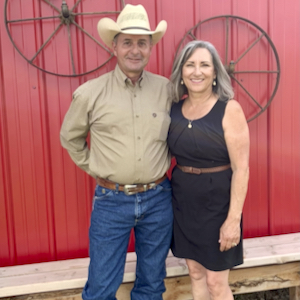
This experience shaped Schellenberg’s commitment to investing in the future of the Canadian beef industry for those to come, something that will inform his time as the newly elected president of the Canadian Cattlemen’s Association (CCA).
“I’m a strong proponent of the next generation, and there’s a lot of challenges out there for young people to get started, stay involved and stay viable,” he says. “We need to support them and come up with whatever we can to ensure that they make a successful attempt.”
One such item on his agenda is the improvement of business risk management programs like Livestock Price Insurance, which he’d like to see available across Canada. With volatility and uncertainty being the biggest challenges currently beyond a producer’s control, he states, this is where modern risk management programs can play a role.
“But they also need to be revised and improved as time progresses, and it’s definitely a time now to take a second look at what needs to change,” he says.
“I’m pretty passionate about Livestock Price Insurance being a cost-shared premium, just like all the other commodities, so that young producers can actually lock in a guaranteed base price on cattle and know that that is there, and you can utilize it just as we would with fire insurance.”
When he considers the trials he experienced as a young producer and the hard times faced by previous generations, Schellenberg has a sense of what today’s young farmers and ranchers are dealing with.
“If I look back to the generations before my time, they went through the Depression … the First and Second World Wars. Each generation has had challenges, and through that it can build strength. And definitely you can gain a lot of good advice by leaning on those people that have experienced some of that,” he says.
There’s plenty of that strength and history steeped into the land that supports this family. The ranch was purchased by Shannon’s great-uncle, Pete Perrin, in 1943. Shannon’s parents, Ted and Olive Perrin, became the second generation of shareholders in this operation. Today, the Schellenbergs have three children and nine grandchildren, and their son Coy and his wife Lauralie are their partners in the ranch, now known as Perrin Ranching 1990 Ltd.
“Coy’s the fourth generation going into the partnership, and his kids are fifth. So we’re excited to have them involved, and our non-ranching kids are still indirectly involved, coming home and helping with some of the day-to-day tasks — branding, things like that.”
The ranch comprises 14,000 acres, with much of it being native rangeland. In this semi-arid, short-grass landscape along the north shore of Lake Diefenbaker, rainfall is limited and has been in short supply the last few years. They run 475 commercial cows and 100 yearling heifers, with Black Angus genetics making up the majority of the herd, as well as some Simmental. This breeding direction was a deliberate choice to suit their conditions.
“The Angus cow has definitely shown the benefit for this environment,” says Schellenberg.
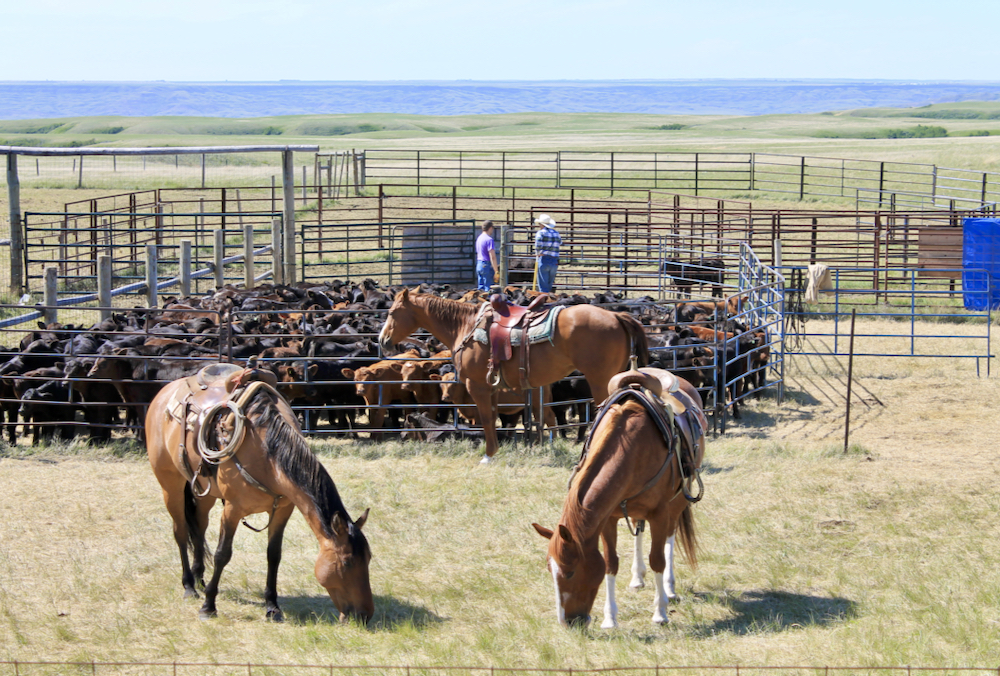
The family is certified with Verified Beef Production Plus, and Coy worked as the program’s Saskatchewan co-ordinator for seven years. “We believe in quality assurance and like the producer-friendly method that that program provides for us to participate. And it’s been beneficial from the feedback we get from the gentleman that buys our calves.”
Giving back
The importance of contributing to industry organizations was imparted to Schellenberg by the previous generations of his family’s operation. Perrin Ranching has a history of involvement with the Saskatchewan Stock Growers Association (SSGA), as Pete Perrin served as the association’s president, and Schellenberg’s father-in-law Ted Perrin was active on its executive. They wanted to see somebody carry that on, says Schellenberg, who was part of SSGA as a director, zone chair and executive board member.
“The mindset behind that is it’s good for people to take their turn. We always encourage producers to try and commit a little bit of time to being involved with your association and lobby efforts for industry.”
Following his time with SSGA, Schellenberg became involved with CCA in 2010, when he was elected as a director to represent Saskatchewan. While serving as vice-president from 2020 to 2022, he co-chaired the foreign trade committee. Before that, he chaired the animal care committee in his early days with the association. When the animal health and care committee was formed, he served as the committee’s co-chair with Pat Hayes of Val Marie, Sask., from 2016 to 2020.
Animal health and care has always been an important focus for Schellenberg throughout his involvement in CCA, and the creation of a foot-and-mouth disease (FMD) vaccine bank in Canada is one of his main priorities as president. With a potential FMD outbreak estimated to have a $60 billion impact on the Canadian economy, CCA recently placed a request with the federal agriculture minister for funding toward the FMD vaccine bank as part of the 2022 budget.
“It really is time for Canada to be on their own, have their own supply and have it handy and readily available. I think through the lessons learned over the past two years with COVID-19, I would hope that the federal government would understand the importance of preparedness and having something available in a timely manner,” says Schellenberg.
Increasing market access globally is another priority. Adjustments to the future free trade agreement between Canada and the U.K. will be key to balancing trade for both parties (currently there is an interim agreement in place to preserve trade continuity). As well, sharing the beef industry’s positive environmental impact remains a significant part of CCA’s efforts in lobbying the federal government and building public trust.
“It’s our job as CCA and the beef industry to make it very clear that cattle and rangeland are part of the solution, not the problem,” he says.
“That’s the key message we have to really focus on and emphasize and gain as much support and traction as we can because we know the livestock sector tends to get blamed for some of these things. Our alternative is bringing awareness that rangeland management and grazing of livestock is actually a benefit rather than a liability.”
With his interest in rangeland conservation, Schellenberg is encouraged by recent stakeholder collaboration efforts to bring this message to the public, such as the acclaimed documentary Guardians of the Grasslands.
“We’re all starting to realize that if we work together on this, we can preserve the native prairie land and rangelands across the country,” he says.
“When you can work collaboratively with the conversation groups like Ducks Unlimited and (Nature Conservancy of Canada), that brings a lot more awareness at the federal level than if you try and just do it on your own.”
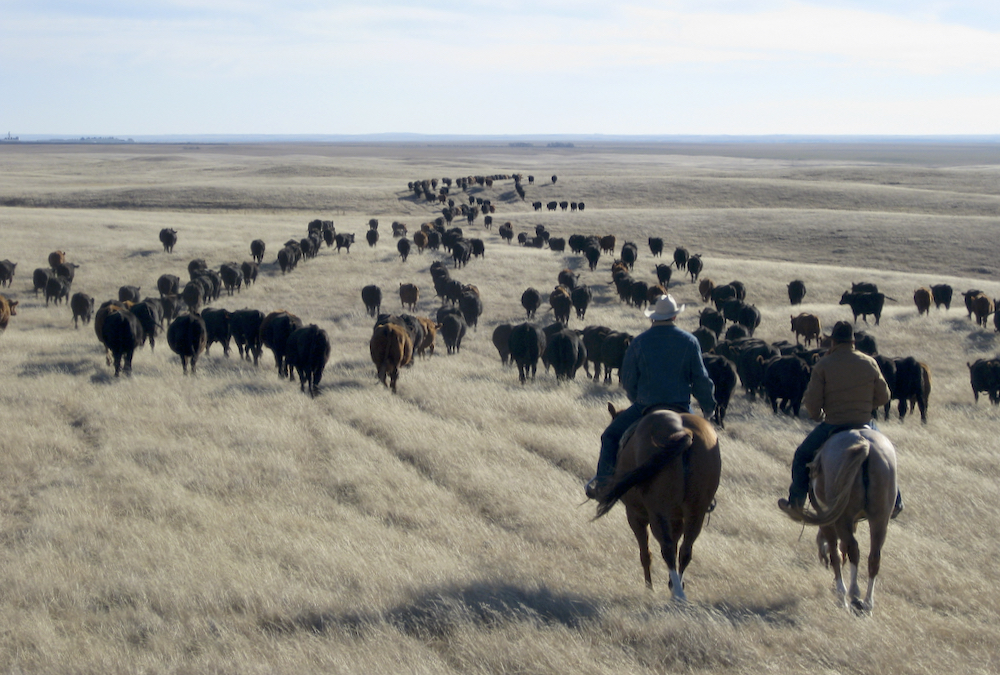
Remembering your roots
Schellenberg’s passion for the future of the Canadian beef industry aligns with his personal motivation for raising cattle. “If you’re blessed to have another generation that wants to be involved, that makes it so much more worthwhile,” he says.
“It’s neat to see the many different families across the nation that have either got a family member or a younger partner that’s come in that’s enthusiastic, that has the same interest, the same passion.”
Finding enjoyment and fulfilment in this way of life is crucial, he believes, to weather the storms that raising cattle can sometimes bring and build something bigger.
“We realize that we work hard, don’t get me wrong. But if you enjoy your way of life, it makes it that much easier to take those tough days as well, and there’s been many good days that we look forward to,” he says.
“For myself, in terms of sustainability, there are family operations across the country that can attest to sustainability as being able to carry on for multi-generations and still be in existence and still be viable. And that comes because of sacrifice from each generation and the contributions that we make.”
When it comes to making meaningful contributions to the Canadian beef industry as CCA president, Schellenberg takes this responsibility to heart, emphasizing the teamwork and collaboration that’s required when advocating for producers across the country and understanding their challenges. This perspective has kept him grounded when working with producer organizations over the years, and it’s something that’s top of mind as he takes on this new leadership role.
“When I was first asked to let my name stand to run for CCA, there was a fellow cattleman I have a lot of respect for, and he called me aside and … he said, ‘Reg, do not forget your roots.’ Don’t forget the people that you represent, and make sure that you always keep in mind that you are there on their behalf, representing their concerns and their interests,” he says.
“I think that’s key for CCA. As long as we can protect, preserve and promote the beef industry for the hard-working families across the country, that’s our key priority.”





